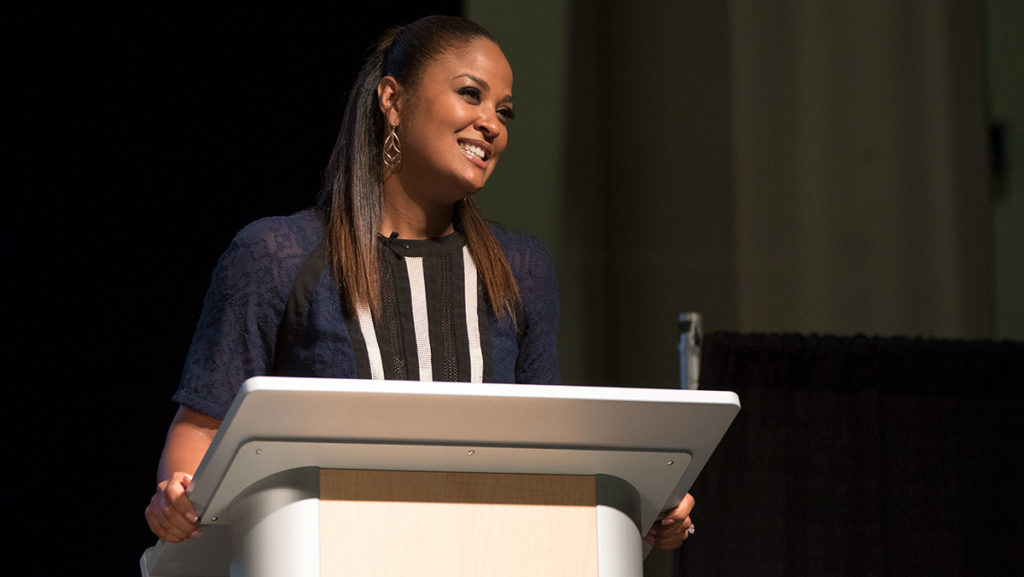“Like my father, people being against me was what fueled my fire,” she said. “That competitive streak in me just made me want to prove it to them more.”
Her life story and having freedom over choosing her destiny was the focus of Ali’s address to an audience of about 1,500 members of the Ithaca College community in the Athletics and Events Center on Sept. 29. Her talk, part of the Roy H. Park School of Communications’ Distinguished Visitor Series, deviated from the usual theme of the series, which brings leading figures in the communications industry to the college, usually with a focus on print and broadcast journalism.
Ali, undefeated boxing champion, television personality and health and wellness expert, told her story of struggling to decide what she wanted to do with her life and what kind of person she wanted to be. She then opened the floor for a Q&A session with the audience.
She opened her address acknowledging that people often ask her what it is like to be Muhammad Ali’s daughter, to which she responded by saying it is the only life she has ever lived or known.
Ali said that after her parents divorced and her mother remarried, she fell in with a bad crowd and was sent to a juvenile detention center as a teenager for shoplifting.
“I remember the arresting officer looking at me and thinking, ‘She has no remorse! This one right here had a bad attitude,’ because I was proud of what we had done,” Ali said. “This judge sent me to juvenile, and I started crying right away. I remember looking back at my mother and there was nothing she could do.”
If she had the chance, she said, she wouldn’t change any of these circumstances in her life. After having been in the detention center, she said, she had the freedom to do whatever she wanted in life and she never wanted that to be taken from her again.
“As scary as that whole situation was, I would never change it because I learned so much about myself and about the world and about other people,” Ali said.
After retiring from boxing in 2007, Ali said, she suffered from depression because she didn’t know what else life had to offer her. Ali said she decided it was time to redefine her public image and dedicate herself to promoting fitness and health.
Ali concluded her speech by saying she wants to reach out to young women and inspire them to achieve their life goals.
During the Q&A session, a student raised the point that Ali had previously declined to publicly comment on the police shootings of unarmed African-American men when the Huffington Post questioned her on her support of the “Black Lives Matter” movement. Ali responded by saying though she identifies with the notion “All Lives Matter — including black lives,” no one can really know what her opinion is on something when a quote is taken out of context.
“I was working with Colgate for their ‘Healthy Kids Campaign’ and that was not the time to ask me about that,” Ali said. “You can’t always just take one sentence or one paragraph and say you know exactly how somebody feels about something.”
Sophomore Carlie McClinsey said this was an important point, not just as it had to do with the student’s question, but also as it concerns student journalists with an obligation to tell a complete story.
“I think it resonates on a different level as it pertains to how disability is portrayed in the media,” McClinsey said. “We should be looking at the strengths in people and how we can get the full story and represent people in a positive light.”
In the hour before the event, Ali delivered a lecture to students in the Media for Social Responsibility course. The course’s theme this year is the portrayal of disability and chronic illness in the media. Bryan Roberts, associate dean of the Park School, said he and other faculty chose Ali because of her close ties with her father, who suffered from Parkinson’s disease for the later part of his life.
A photo series was projected onto the screen behind Ali, spanning her years as an infant to her father’s final days this year in June.
As her father’s health declined, Ali said, he retained charisma and confidence, going as far as to light the torch at the opening ceremony at the 1996 Olympics in spite of his shaking hand.
Over 80 students attended the lecture. Roberts said the decision to host Ali garnered tremendous approval from the campus community because disability and chronic illness are rarely discussed on the college campus.
“Her story … is one of resiliency, and I think that’s something we could all learn from,” Roberts said. “This is not about her being a fighter. This is about her being a daughter, a mother and having a father with a chronic illness.”








